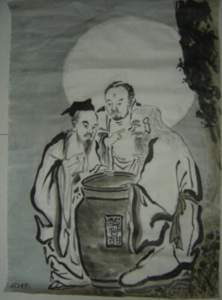Contact Us
Te Publishing • 25 Liberty Drive, Unit 545 • Cartersville, Ga 30120 Publisher Email: info@TePublishing.com • Email Buddy C.: info@BuddyC.org • Webmaster: admin@BuddyC.org

As I explored various belief systems, I came across the story of the Vinegar Tasters, inspired by the painting of the same name.
This painting depicts a metaphorical meeting between Confucius, Buddha, and Lao Tzu, founders of Confucianism, Buddhism, and Taoism, respectively. They each sampled vinegar, a common pastime in China during that era. Each man’s reaction reflected their philosophies.
Confucius spat out the vinegar, asking, “Why taste something so vile?” Confucianism includes rules to correct moral decay. Much of China still follows Confucius’s teachings, which are similar to the Old Testament Proverbs.
Buddha swallowed the vinegar and suffered through the taste. He stated that life is filled with suffering. Similar to his experience with the vinegar, our desires and attachments lead to suffering in life.
Lao Tzu tasted the vinegar and smiled. He smiled not because the vinegar was pleasant but because it tasted exactly as it should — acceptance! Lao Tzu accepted the vinegar as perfect, needing no approval or effort to fix.
This painting reminded me of the story “Acceptance Was the Answer” from the book Alcoholics Anonymous. I realized that acceptance is only possible by surrendering to the present moment. The more I read Taoist philosophy, the more I recognized recovery principles. I began to notice A.A. slogans like “All Is as It Should Be” and “Let Go and Let God” illustrated in various Taoist texts.
Taoism’s primary text is the Tao Te Ching, loosely translated as “The Book of the Way of Virtue.” The Tao Te Ching (pronounced Dow-De-Ching) is the second-most widely published book in the world after the Bible. I had already been following this “Path of Virtue” without realizing it.
Through years of studying Taoist philosophy, I have discovered a practical spirituality that has impacted every area of my life, especially in surrendering more of my will and life’s cares. I came to realize that the Tao reflects how Love operates in the world, including in my own life. As long as my spiritual foundation is Love, I do not need to adopt any other belief system; Taoist philosophy supports my Christianity rather than opposing it.
Recently, I felt inspired to share my experience of applying the Tao Te Ching to my life. This interpretation of the Tao Te Ching is the result.
Keep in mind this is not a translation of the Tao Te Ching – only my interpretation through the lens of my experience.
I hope these verses will help anyone struggling to find a “God of their own understanding” and improve your ability to surrender to What Is. You can use these verses in your daily meditations or at any time you are looking for comfort, guidance, or inspiration. They work for me, and I hope they work for you too.
Buddy C.
Atlanta, Ga
March 2021
Te Publishing • 25 Liberty Drive, Unit 545 • Cartersville, Ga 30120 Publisher Email: info@TePublishing.com • Email Buddy C.: info@BuddyC.org • Webmaster: admin@BuddyC.org